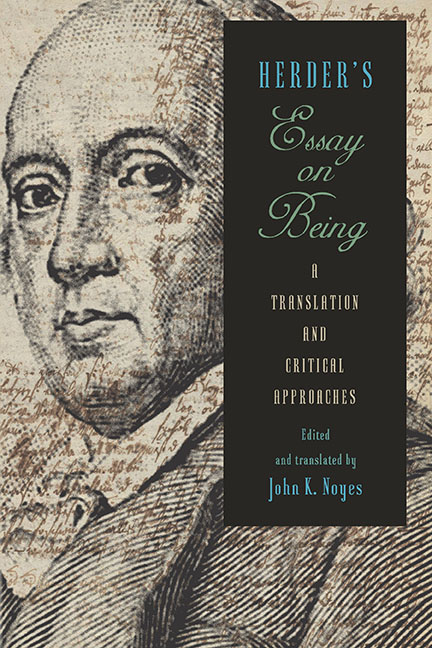Book contents
- Frontmatter
- Contents
- Acknowledgments
- List of Abbreviations
- Introduction: The Essay on Being
- Part I Versuch über das Seyn, by Johann Gottfried Herder
- Part II Critical Essays
- Herder's Essay on Being
- The Order of Being and the Order of Ideas: The Historical Context of Herder's Essay on Being
- Indivisible, Inexplicable, and the Center of All Certainty: Herder's Concept of Being
- The Metaphysical Foundation of Subjective Philosophy in Herder's Essay on Being
- Herder's Kantian Critique of Kant on the Concept of Being
- Attempting to Place the Essay on Being
- Herder's Early Neoplatonism
- Being, Possibility and God: A Comparison of Herder and Heidegger
- Bibliography
- Notes on the Contributors
- Index
The Order of Being and the Order of Ideas: The Historical Context of Herder's Essay on Being
from Part II - Critical Essays
Published online by Cambridge University Press: 13 April 2019
- Frontmatter
- Contents
- Acknowledgments
- List of Abbreviations
- Introduction: The Essay on Being
- Part I Versuch über das Seyn, by Johann Gottfried Herder
- Part II Critical Essays
- Herder's Essay on Being
- The Order of Being and the Order of Ideas: The Historical Context of Herder's Essay on Being
- Indivisible, Inexplicable, and the Center of All Certainty: Herder's Concept of Being
- The Metaphysical Foundation of Subjective Philosophy in Herder's Essay on Being
- Herder's Kantian Critique of Kant on the Concept of Being
- Attempting to Place the Essay on Being
- Herder's Early Neoplatonism
- Being, Possibility and God: A Comparison of Herder and Heidegger
- Bibliography
- Notes on the Contributors
- Index
Summary
Nemo potest cupere beatum esse, bene agere, et bene vivere, qui simul non cupiat, esse, agere, et vivere, hoc est, actu existere.
—Spinoza, Ethica (1677)One of the greatest Reasons why so few People understand themselves, is, that most Writers are always teaching Men what they should be, and hardly ever trouble their Heads with telling them what they really are.
—Bernard de Mandeville, The Fable of the Bees (1714)Being is not a thought, not an opinion; it is Being.
—Herder to Friedrich Heinrich Jacobi (1792)Dasein ist Pflicht, und wärs ein Augenblick.
—Goethe, Faust: Der Tragödie zweiter Teil (1832)IT WOULD APPEAR THAT the Essay on Being has now come to occupy a similar central position in the research on Herder's philosophical development as The Oldest Systematic Program of German Idealism (1797) of the Tübingen Circle in the history of German Idealism—even though it has never been fully decided whether the authorship of the latter document is to be attributed to Georg Wilhelm Hegel (1770–1831), Friedrich Hölderlin (1770–1843), or Friedrich Wilhelm Joseph von Schelling (1775–1854). One particular problem in interpreting Herder's Essay is to be found in the text itself, as evidenced in the new transcription by Hans-Dietrich Irmscher and Heinrich Clairmont. In the rich discussion of the existing research by Marion Heinz in this volume, she shows how important the Essay on Being was for Herder, in which he staked out an independent position on the basis of his altercation with Kant and thereby set the direction for his further writings. This is certainly correct. However, his equally important engagement with the Leibniz of the posthumously published Nouveaux Essais only began in 1765, that is, one year after the Essay on Being. Subsequently his studies of the hitherto unknown text added new nuances to his work, as he continued to distance himself from his Königsberg training under Kant and Hamann. Following Herder's excerpts from the Nouveaux Essais, the results were to become apparent in the no less significant sketch Zum Sinn des Gefühls (On the Sense of Feeling, 1769). Here, he gives the Essay on Being a decisive new dimension with the tenet “I feel! I am!” (“Ich fühle mich! Ich bin!”), which Herder places in opposition to the Cartesian “Cogito, ergo sum,” which is now basic for the constitution of knowledge itself.
- Type
- Chapter
- Information
- Herder's Essay on BeingA Translation and Critical Approaches, pp. 89 - 107Publisher: Boydell & BrewerPrint publication year: 2018

